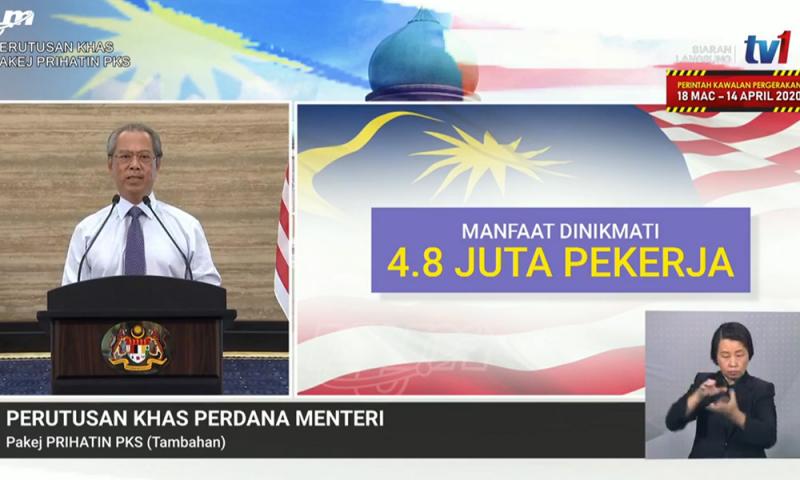LETTER | WSP 2.0 – more is needed for hard-hit sectors
LETTER | The newly targeted Wage Subsidy Programme 2.0 (WSP 2.0) introduced by the government under the Prihatin Supplementary Initiative Package (Kita Prihatin) has brought relief to many, especially to businesses that are yet to fully recover following the economic catastrophe of Covid-19. But perhaps, more can be done to help businesses in sailing through the storm – increasing the WSP amount per employee.
In brief, WSP 2.0 still shares the same goal as its previous version – to prevent workers from lay-offs which would result in them losing incomes.
According to Muhyiddin Yassin, the implementation of the programme is expected to benefit 1.3 million workers and it involves an allocation of RM2.4 billion.
Just to recap, under this new scheme, only companies which are still facing a loss of sales of 30 percent on an annual basis since the recovery movement control order are eligible to apply.
Indeed, WSP 2.0 is a good move – apart from protecting both employees and employers, WSP 2.0 would help reduce the unemployment rate further in Malaysia.
If we look at this in detail, in March, Malaysia's unemployment rate was at 3.9 percent, but went up drastically to 5.0 percent and 5.3 percent in April and May respectively following the implementation of the MCO.
But it appears that the positive effect of WSP started to show after the month of May as the unemployment rate began to fall to 4.9 percent in June and then to 4.7 percent in July.
Well, another good news - according to the Department of Statistic Malaysia, after three consecutive months (March-May) of registering employed individuals below 15 million, the figure in July went up to 15.07 million individuals.
This increase was contributed by the services sector, mainly in accommodation, food and beverages and transport and storage activities – following the reopening of most economic sectors.
Indeed, this improvement, albeit small, reflects the effectiveness of WSP in addressing Covid-19 by providing much-needed support for industries in sustaining their businesses and safeguarding employment.
Nevertheless, although recovery is underway, the labour market is expected to face hurdles as some relief measures will be expiring at the end of September.
For example, since the loan moratorium will end in September, people will have less purchasing power, thus, making it worse for the companies particularly the SMEs to stabilise their businesses further. Surprisingly, even now, sales have not been picked up to 70 percent yet.
Thus, despite the positive move made by the government, there remain certain issues to be looked into and considered. For instance, according to Malaysian economists, data shows that massive retrenchment is still taking place in the hardest-hit sectors such as aerospace, aviation, tourism as well as construction.
Thus, one way for the government to assist these sectors which we know will take longer time to recover compared to the others, is perhaps, by considering an increase in the wage subsidy amount, from the current amount of RM600 per employee that covers about 18.6 per cent of the average wage in the national level.
This increment could be increased to at least 40 per cent of the national average wage (RM3,224) and specifically targeted to the abovementioned sectors.
In other words, the RM600 WSP can be retained but increased for specific sectors. Besides that, this new amount could also be adjusted based on how quickly a business is projected to recover – well, to make it fair to the others.
If we look at the other countries, this kind of programme involves more than 50 percent of the workers’ average salaries.
In the United Kingdom, employers can claim 80 percent of furloughed employees' usual monthly wage cost, up to £2,500 (RM13,280) a month, while in Singapore, 75 per cent of the wage for workers earning less than S$4,600 (RM13,941).
However, following the implementation of WSP, Finance Minister Tengku Zafrul Aziz revealed that the government has received reports of employers not channelling the allocated subsidy provided for this programme to their workers.
Thus, another equally important thing – to ensure that this programme is not being monopolized and abused by irresponsible employers, the authorised body or agency that is in charge should constantly monitor this programme.
In critical moments like these, it is definitely not the time for dishonesty which can cost livelihoods. Therefore, make use of the government’s assistance not only for your own good, but for the employees, and of course - for our country’s restoration.
The writer is research assistant at Emir Research, a think tank focused on strategic policy recommendations.
The views expressed here are those of the author/contributor and do not necessarily represent the views of Malaysiakini.
RM12.50 / month
- Unlimited access to award-winning journalism
- Comment and share your opinions on all our articles
- Gift interesting stories to your friends
- Tax deductable
